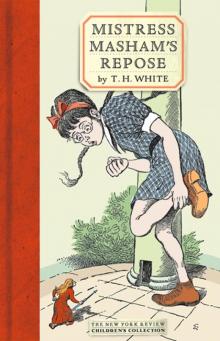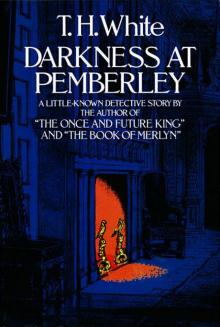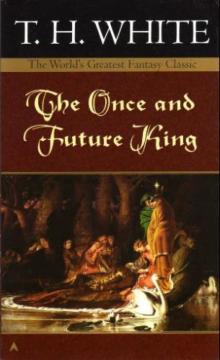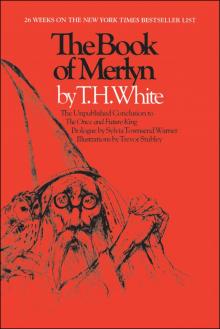- Home
- T. H. White
Darkness at Pemberley Page 15
Darkness at Pemberley Read online
Page 15
Smith said: "There's ports in Wales, too, sir. What price Cardiff?"
Buller suddenly sat down on the tyre and, in a curiously strangled voice, made the time-honoured protestation.
"Smith," he said, "what does he want with her? What is he going to do to her? What's he done to her? God, if that so-and-so's hurt a fibre of her body I'll wring his bloody neck till his head comes off."
*****
The job was easier than it had threatened to be. By the time that the two following cars roared over the hill-brow from Longtown it was finished.
Charles and Wilder got out stiffly, and walked over. They heard the news in silence.
Charles asked: "What do we do now?"
Buller replied: "I don't know what we can do. It's no good carrying on with this chase any further. He might be eighty miles away by now. There's nothing to do at all, except, I suppose, to go back to Pemberley."
"But he must be somewhere about here. He wouldn't have come here otherwise. What's the sense of going back again?"
"I admit that he's probably within an eighty-mile radius, but even that's not certain. He may have led us here in order to double back himself, by train perhaps, in exactly the opposite direction. Elizabeth may be gracing a wild-fowler's hut on the Wash by this evening. We just don't know why he's brought us here or where he is. There's nothing to do, so we might as well go home."
"But we can't give up?"
"Not finally. But we must for the moment. Sooner or later we shall hear from the police that the Bentley has been found abandoned in the Mynydd Nallaen or left in a car park at Swansea or something of that sort. They'll identify it by the registration number. You'll write back and say: Thank you very much, I left it there by mistake. You'll have to pay the fine. When we know where it was left we may be able to get something by making enquiries in the district. On the other hand, probably we won't."
Buller looked dejected and added slowly: "But the main hope is this. Mauleverer must have kidnapped Elizabeth for a purpose. If he'd done it merely out of spite against you it isn't likely that he'd have gone to the trouble of kidnapping her. He'd have murdered her and saved a lot of bother."
The voice faltered. "He's a devil," he concluded, "and of course he may have kidnapped her in the realisation that the uncertainty would be almost worse than finding her dead. He may," and here Buller spoke with an unnatural precision which deceived nobody, "he may have killed her and hidden her to prolong the agony. But what we must hope for is that he's taken her as a hostage. He hasn't been able to get at you, Charles, in the past few days. So he may intend to deliver some sort of ultimatum."
"You mean that he'll ring us up or send us a note saying that unless I go to a certain spot alone at a certain time Elizabeth will be done in?"
"Something of that sort," said Buller. "And in that case we shall have a hint of his whereabouts at any rate. We may be able to think something up by then."
"Which all points," Wilder summed up, "to our getting back to Pemberley as quickly as possible, so that we can be available to his telephone message and to the police notification about the finding of the car."
*****
At Pemberley they had a late luncheon and Buller spent the afternoon in the garden. He walked restlessly about the tennis courts, sat down on garden seats, and got up again almost before he had crossed his legs. The wildfowl on the lake retreated to the further shore as he approached them, and had no sooner ventured out when he approached again. He smoked pipes in an endless succession, filling and lighting them nervously, with jerky movements of his hands, and relighting them absently as they went out.
At teatime he came in with a determined air and took Wilder by the second button of his coat.
"Look here," he said. "We can't let this go on. We must notify the police and get a wide net out at once." He looked at Wilder anxiously.
"I've thought about all that," he continued, before the surgeon could reply. "Even if there are enquiries and an awkward situation about Kingdom I can take the responsibility. If they don't believe in Mauleverer—as I'm afraid they can't—we ought to be able to work out a story which holds water. I don't mind saying that I killed Kingdom myself. In half an hour we could get everybody word perfect to back up my confession——"
Wilder broke in good-humouredly.
"You forget," he said, "that my burial certificate is already out. Have I got to be hanged as an accessory?"
Secretly Buller had hoped that he might offer to be.
"Well——" he said.
Wilder dashed his hopes to the ground.
"I don't want to be hanged at all."
"Listen," he added, and took Buller's arm. "You're upset about this, old man, and I don't blame you. Everybody's noticed you and Elizabeth. But you mustn't let yourself get rushed by your feelings. If we get the police in now we're all in a criminal position. Everybody's in it. It isn't only you or I. It's Charles and the servants and even more or less unconnected people like Edgeworth and Hankey. There isn't a hope for your concocted confession. For one thing nobody would back you up. If anything's going to be told we'll tell the truth. And then, on top of that, all your arguments against police protection are still operative, and, finally, the police may not be able to do any more good than we can."
He paused for emphasis and then continued:
"If we must get the police in we can do it to-morrow. By then we may have received Mauleverer's ultimatum. We must give the present situation a chance of development. It may turn out, when we hear from Mauleverer—as we're bound to—that we can do without the police after all. We may be able to ambush him whilst he's ambushing Charles at whatever rendezvous he appoints."
Buller said: "But it may be too late by to-morrow."
"Now, be sensible. If it's going to be too late by to-morrow, it's too late to-day. If Mauleverer meant to kill Elizabeth, since we must face it, he'd have killed her already: and if he has killed her, it's no good running our heads into nooses simply for the satisfaction of finding her body a little sooner. You're off your head with worry, old man, and I don't blame you. But you mustn't be rushed into hasty action on that account. If Elizabeth's dead, wouldn't you rather make him pay for it yourself? And if she's alive, you'll save her best by giving the enemy time to reveal his position."
"But think what he may be doing to her now."
"Bosh. Elizabeth's able to look after herself. You're jealous. Come and have tea, and don't be a fool. I tell you what. If we don't hear from Mauleverer in the next two days I'll back you up in any confession you like to concoct and we'll swing together."
With this concession Buller had perforce to be content.
The subject was not re-opened at tea or dinner, and the household went to bed in sad disquiet.
*****
Buller lay in bed. He was far too tired to sleep, had forgotten almost how to. His brain was swinging in his head, whilst the imagined roads of last night's chase swung to left and right before his smarting eyes. He was driving a car, endlessly, at impossible speeds, along roads which forked and turned in every direction. The crossroads leapt at him, filled with approaching cars, and reeled backwards menacingly, to be succeeded immediately by equal dangers.
Buller decided that he would soon be mad. In all the cars Elizabeth was huddled, her face pale, her red lips bloodless. She sagged beside the maniac at the wheel, impotent, enigmatic, possibly dead.
Buller wrenched his mind from the nightmare, laid his body straight out on the bed. He tried to relax his muscles, to lie quietly, to think visually instead of problematically. If only he could apply his mind to some subject of the eye alone, to the recollection of a view or the design of a picture, he might be able to sleep. And sleep he must, if he were to help Elizabeth to-morrow.
With the repetition of the name her whole body and action solidified before him, a compost of a thousand words and gestures, so that he writhed in the bed and started up, cursing.
He must do something. He must think. He
must review his strategy, or anything, rather than be haunted by that image, in lovely flesh and undecided danger.
First of all, he had been a fool not to insist that somebody should sleep with Charles wherever Mauleverer might be. This was the third night that Charles had slept alone. It had all been inaugurated by the necessity of watching the bolt-holes on that fatal night when Kingdom had been butchered. But on the two succeeding nights he had seen to it himself that Charles kept up a fire. To-night he had been too worried, and if he understood Charles the latter would have been too forgetful. It was a warm night, for the spring had come at last, and Charles would probably have decided against a fire even if he had remembered it.
Buller got out of bed creakingly, put a hand to his forehead in a gesture of utter weariness, and shuffled with his slippers. He struggled into an ancient coat and padded off along the passage.
Charles's door was not locked or bolted. The day's confusion had broken down all precautions. Buller swayed slightly in exhausted annoyance and opened the door.
The light was on. Charles was lying motionless on his back. At the foot of the bed, leaving him like a surprised and reluctant vampire, a black figure writhed already towards the fireplace. It was clad from head to foot in black: in a black high-necked sweater, long black stockings, and black drawers. The feet were in black beach-shoes, the head in a black mask with mica goggles and a nozzle. The hands were in white kid gloves.
Even as Buller sprang forward the figure melted into the great fireplace, the thin black legs jerked for a moment in an upward leap. It had moved across the pile carpet as soundlessly as death itself, and vanished like the shade.
CHAPTER XVIII
Buller was across the room in two strides, and stared down at Charles for a divided second. The man's eyes were open and he appeared to be breathing. Buller seized his wrist and felt for a pulse. He found it. He did not wait to undo the buttons of the pyjama jacket, but tore it open, sending the buttons flicking across the room to fall soundlessly on the carpet. There was no visible wound.
Buller acted callously, but his mind was racing to a new idea. He felt in Charles's pockets on the chair and snatched his revolver. Then, turning in the same movement from the bed, he was across the room and peering up the chimney.
The fire had never been lighted, as he feared. Within the stretch of his arms was a blackened ledge. He rammed the revolver in the pocket of his coat and jumped.
The sooty brickwork crumbled and cut painfully into his hands. His knees barked against the uneven ridges of the mortar, tearing his trousers as he jerked spasmodically for a hold. He had forgotten his weariness now and was ready for all comers.
He gained the ledge, finding it was a horizontal platform which led back to a sheer drop. Evidently the chimney of Charles's room came into the main vent at a right-angled bend over this platform.
He moved forward, stooping cautiously in the pitch darkness, through the oily smell of soot, until his hands touched the corner bricks where the flue of the side passage entered the vertical shaft. Here he paused, carefully yet quickly feeling the surface all round.
He knew that there was a vertical drop before him, right down to the fireplace of the main dining-room. He was not sure of the breadth of this shaft and dared not trust himself forward into the void.
If it were narrow enough he could support himself, and work himself upwards with his back against one side and his feet against the other, like a mountain climber in a fissure. He tried to guess its breadth by picturing the dining-room fireplace, but he could not remember, and the breadth of the chimney might alter between that point and this. All this time Mauleverer was presumably making his escape.
Buller sat down and reached out across the shaft with his feet, hoping to touch the other side.
He touched nothing.
He rose to his full height and did the bravest thing he had ever done. He did it without the faintest doubts and was not afterwards able to see that it required any courage. In fact, it probably did not, for it was a means to reach Elizabeth. He would have leapt off the Eiffel Tower for that object, without qualms, for the object dimmed any consideration of possible consequences.
Buller slowly launched his body forward into the empty well of night, throwing his hands in front of him as if he were diving. For a terrible second there was nothing, and then they rasped against the brickwork. His shoulders reached the opposite side. He slipped down a couple of feet and righted himself. The main shaft was narrow enough to work himself upwards.
Buller began to wriggle furiously, gaining six inches at a time. He worked as nearly as possible in silence, quelling his laboured breathing with an effort, though the soot and smoky reminder of last night's fires left him gasping for breath.
He had covered a few feet, carrying his revolver pocket in his straining lap to prevent it banging against the walls, when his hand touched hemp. A rope dangled down the main flue beside his elbow.
He tested it softly, trusting only a small part of his weight to it at a time. It held.
Buller began to work himself upwards more quickly, hand over hand, but still keeping his back to one wall and his feet to the other. He passed an opening in the chimney where a side flue came in from one of the bedrooms.
After a few more yards his head struck an overhanging ledge, where the chimney narrowed, apparently to admit the large sloping shaft from the morning-room.
He had to abandon his horizontal pressure of leg and back in order to negotiate this, and was trusting himself entirely to the rope when the rope gave.
The man above him must have severed it at the critical moment, as if he could see in the dark. But Buller had one arm over the ledge, and clung there, kicking with his feet against vacancy whilst the rope rattled past him. A coil flicked against him, almost dislodging his precarious hold. He kicked himself into safety, his jaw set in determination: even in grim relief. At least he knew that the man was there.
He sat on the ledge panting silently, trying to still the thunder of his heart so that he could listen. He remained absolutely motionless till he could hear the soft sifting of the falling soot. He wondered if Mauleverer would believe that he had fallen. There was the faintest hope that he might, if he gave no sound, although the body would presumably have raised a great clatter as it crashed into the dining-room fireplace. He tried to imagine the sound that a body would throw up a forty-foot shaft by striking the bottom of it. The rope had given a sweeping thump. Would that be enough?
Buller sat perfectly still for nearly five minutes, straining his ears in the darkness, differentiating with anxious attention between the small sounds of night.
He could be sure of nothing. The darkness itself seemed to have a sound: the welling void sound, almost, of a seashell lifted to the ear. It oppressed and engulfed him, weighing him down into the abyss.
Buller secretly and patiently stretched out his legs to reassume the upward tussle. He moved now with infinite caution, slowly winning his progress, inch by inch, as silently as a bat.
A new flue gave him some difficulty, and he paused beside it, listening intently. He must not pass his enemy and let him take him in the rear.
He stayed beside it until he had picked out the crepitation of every brick and could swear nobody was breathing, no heart beating except his own. Then he crawled upwards into the night.
He kept his head back, peering intently at the faint square of starlight above him. The morning-room ledge had blotted it out before, but now he could distinguish the faded heaven, pricked into being by two stars, unnaturally bright. If anybody should move across that background he would fire. The revolver weighed heavily on his thighs.
After an eternity of motion, when his heart would burst, Buller reached another shaft which sloped in at a gentle angle from a bedroom in a higher storey. The last storey before the dormers of the attic.
He paused here, as before, and waited for his pulses to allow the silence. There was no silence. There was breathing within an
arm's length of his ear.
*****
Buller remained motionless, holding his breath to make sure that it was not his own. The breathing seemed to stop. Almost certain that it was an echo, he breathed again: the echo seemed to start before him. He took a deep respiration, the other breath seeming to inspire at the same moment, and held it as long as possible. But he was short of breath from his exertions and had to let it out. In the middle of the expiration his ear seemed to catch the outlet of the other.
Buller made a great effort and prolonged his breath, listening intently. Within reach of his hand a different person quite separately inhaled.
He drew the revolver from his pocket and weighed it in his hand, altering his position so that his shoulder was against the bricks and his head inclined over it towards the opening of the flue. It would be a simple matter to thrust the revolver sideways into that dark lair and with one percussion end the breaths for ever. But a wild guess restrained him. He slewed round slowly, so that his back was against the adjacent wall of the chimney and the opening of the shaft lay on his right hand. Then, holding his revolver pointed in his left, he softly stretched his right arm into the gap.
His hand touched soot, gently grated on the rough surface of bricks, then descended full on a warm face.
Buller started perceptibly, but the face remained without movement. His hand slipped up and felt the hair. It was fine—and soft—and long.
He slipped the revolver back into his pocket and wriggled sideways like an eel, climbing into the side shaft feet foremost till his body lay side by side with the silent body, and his hands were fluttering over it in a fever of impatience.
Elizabeth was lying on her back, breathing regularly and deeply. He felt her all over with a sort of shamefaced tenderness and anxiety. There were no cords or bonds of any sort to account for her stillness. She was alive, loose and apparently insensible.
Buller, with an ungovernable impulse, and under the supposition that she would never know about it in any case, laid his head beside hers with an audible sigh of gratitude and kissed her nestling ear.

 The Once and Future King (#1-4)
The Once and Future King (#1-4) Once & Future King 05 - The Book of Merlyn
Once & Future King 05 - The Book of Merlyn Mistress Masham's Repose
Mistress Masham's Repose Darkness at Pemberley
Darkness at Pemberley The Once and Future King
The Once and Future King The Book of Merlyn
The Book of Merlyn Candle in the Wind
Candle in the Wind